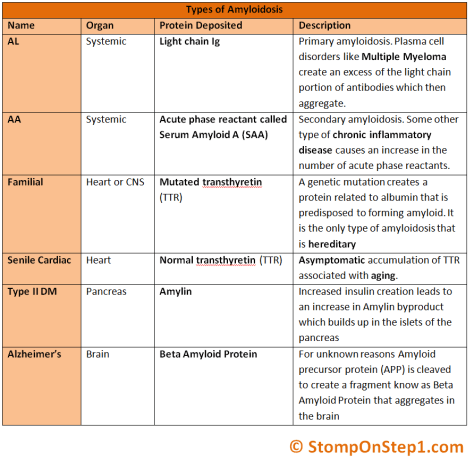Amyloidosis is a collection of diseases that result from misfolded proteins becoming insoluble and aggregating in the extracellular matrix. These misfolded proteins generally form beta pleated sheets. Biopsy specimens of tissue with amyloidosis fluoresce with apple-green birefringence when stained with Congo Red and placed under polarize light.

AL Amyloidosisis a systemic form of amyloidosis of light chain immunoglobulins.Primary amyloidosis. Plasma cell disorders like Multiple Myeloma create an excess of the light chain portion of antibodies which then aggregate.
AA Amyloidosis is a systemic form of amyloidosis of Acute phase reactant called Serum Amyloid A (SAA). Secondary amyloidosis. Some other type of chronic inflammatory disease causes an increase in the number of acute phase reactants.
Hereditary or Familial Amyloidosis is a form of amyloidosis made up of Mutated transthyretin (TTR) that localized to the heart and brain. A genetic mutation creates a protein related to albumin that is predisposed to forming amyloid. It is the only type of amyloidosis that is hereditary
Senile Cardiac Amyloidosis is made up of Normal transthyretin (TTR) and localized to the heart. Asymptomatic accumulation of TTR associated with aging.
Pancreatic Amyloidosis in diabetes mellitus is made up of Amylin and localized to Pancreas. Increased insulin creation leads to an increase in Amylin byproduct which builds up in the islets of the pancreas
Alzheimer’s Amyloidosis is made up of Beta Amyloid Protein. For unknown reasons Amyloid precursor protein (APP) is cleaved to create a fragment know as Beta Amyloid Protein that aggregates in the brain.
Picture Used:
“Gastric Amyloidosis” by Ed Uthman available at http://commons.wikimedia.org/wiki/File:Gastric_Amyloidosis_(Congo_red_stain,_crossed_polarizers)_(3595031587).jpg by Creative Commons 2.0 Attribution
Now that you have finished this video you should check out the next video in the Cell Injury, Cell Death & Cancer sections which covers Dysplasia & the Difference Between Benign & Malignant.


I love it. Many thanks.
Thanks for the comment!
Love it. Getting these basic details gives me a good framework for studying my amyloidosis lecture. Thanks
Thanks for the feedback. Good luck studying!
very nice Thanks
Melvin Hernandez, DMD
Men am really finding this very very helpful… many thanks
Clear and simple!!!
very helpful thanks
thanks for watching!
My best regards that is an amazing way to teach an simple pathway to get high rates in the exam thank you so much RIAD
Hey man, i have some questions for you regarding study tips and strategies. I’m really hitting everything hard- I take my exam in may- and have been studying for 6 months or so, but I’m still really behind. Your videos really help a lot, btw; keep up the great work!
Congrats on getting an early start with your studying & thanks for the feedback! Did you have specific questions? I can’t promise I will have the answer or will have the time to address complicated questions (I’m an intern this year), but I will do my best.